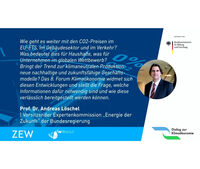News Detail
NostaClimate at the 8th Forum on Climate Economics – Informed Policy and Information as Policy
What role does information play for policymakers to take climate-protective action? How can information itself become politically effective in reaching citizens and creating incentives for them to act in a climate-friendly way? Last week, representatives from science, industry, politics, and civil society showed how these questions can be answered at the German and European level at the 8th Forum on Climate Economics. The forum took place virtually, allowing around 250 people to watch and participate in discussions via chat.
As part of the series of events of the Dialogue on Climate Economics coordinated by the Kiel Institute for the World Economy (IfW), which takes up current issues of climate and energy policy and makes them the subject of discussion between science and practice, the 8th Forum on Climate Economics was organized by five projects of the BMBF funding priority "Economics of Climate Change" and led by ZEW Mannheim. Under the theme "Transparent climate balances – information for climate-friendly action", the participants in the discussion were Prof. Dr. Andreas Löschel, Director of the Center for Applied Economic Research at the University of Münster; Delara Burkhardt, SPD Member of the European Parliament for Schleswig-Holstein; Joachim Lutz, Dean of the Faculty of Business Administration at the University of Mannheim; and Udo Sieverding, Member of the Executive Board of the Verbraucherzentrale NRW. The event was moderated by journalist Conny Czymoch, who was supported by Prof. Martin Kesternich in the role of co-moderator. As consortium partners in the BMBF project NostaClimate, Prof. Andreas Löschel and Prof. Martin Kesternich are addressing, among other things, the role of information for the voluntary reduction of CO2 emissions by non-state actors. Information about the influence of one's own actions or those of third parties can influence one's own climate protection activities, but also contribute to an increase in the acceptance of climate policy.
What cannot be measured cannot be improved
Prof. Gernot Klepper, who introduced the dialogue as a representative of the IfW, emphasized that research should not only take place in academic circles but should also reach out to politics and civil society. ZEW President Prof. Achim Wambach continued this idea in his welcome address, linking it to the importance of information, which is of great significance in the fight against climate change: "If everyone knew what the CO2 content was that went into the production of a certain product, we could make completely different decisions as consumers, and the EU would have a much easier time creating a border adjustment system - that's where the information is lacking so far." Prof. Wolf-Dieter Lukas, state secretary at the German Federal Ministry of Education and Research also explicitly classified this interplay in his welcoming address, emphasizing that data from science and industry form the basis for policy actions, as was the case most recently with the introduction of the national emissions trading system.
A keynote presentation by Andreas Löschel then suggested how, against the backdrop of the statement "If you can't measure it, you can't improve it," the market and competition can serve as a discovery process for opportunities to reduce CO2 emissions in various sectors. While the information on sustainable technologies is undeniably important, from an economic point of view, focusing on emissions trading and CO2 pricing can also be helpful, he said, because such market-based instruments can reduce climate emissions even without information from households or businesses. Above all, the provision of data must follow uniform guidelines, as this is the only way to correctly determine a product's CO2 backpack, i.e. the sum of CO2 emissions from the various steps in the supply chain, and to positively influence consumers' purchasing decisions.
Results of the Roundtables as thematic guidelines
The forum was preceded by two virtual roundtables with representatives of the various fields which were chaired and moderated by Kathrine von Graevenitz and Prof. Martin Kesternich. The impulses developed in the roundtables finally found their way into the panel discussion of the Climate Economics Forum in the form of short statements formulated by the two junior researchers Elisa Rottner and Carina Fugger (NostaClimate). Thus, the reference back to the first roundtable guided the exchange towards the question of the importance of climate policy for German and European companies, their competitiveness, and their CO2 emissions. The second roundtable, in which the NostaClimate project members Prof. Dr. Andreas Ziegler and Elke Groh also were involved, addressed the impact of the Corona pandemic on the social acceptance of climate policy measures. Beyond the roundtable's key finding that awareness of climate policy issues had not diminished in the short term, Udo Sieverding emphasized that many people had the time and opportunity to learn about private investment in climate-friendly alternatives, such as in their homes. Delara Burkhardt added that the pandemic highlighted the need to make environmental change socially just.
The closing words of the participants, once again revealed unity concerning the path to climate neutrality: The fight against climate change needs, above all, a scientific database, which must be politically enabled and framed to be effective. The political framework must ensure the completeness and truth of the data and also make the information available to citizens and companies in a targeted manner.
Further information on the Dialogue on Climate Economics and a recent background paper can be found here: https://www.klimadialog.de/


